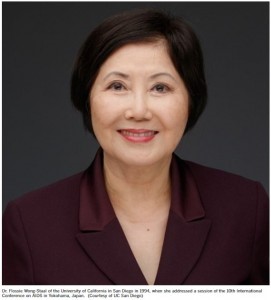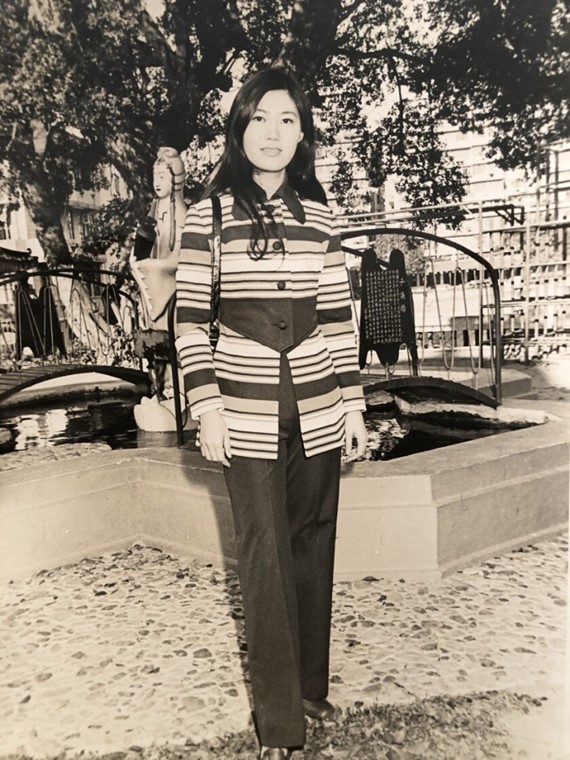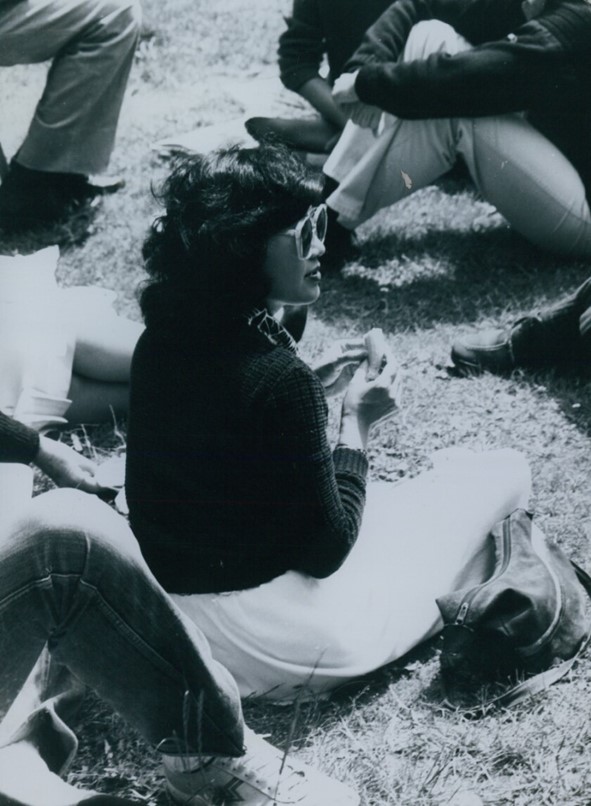Source : www.sandiegouniontribune.com

Flossie Wong-Staal, the Chinese-American virologist who saved countless lives by helping identify the cause of AIDS and who transformed UC San Diego into one of the world’s leading research centers on the disease, died Wednesday in La Jolla. She was 73.
Wong-Staal, who was inducted into the National Women’s Hall of Fame last year with Supreme Court Justice Sonia Sotomayor and actress Jane Fonda, died of pneumonia at Jacobs Medical Center in La Jolla, her family said.
Although she was retired, Wong-Staal continued working as a scientist and was indulging in one of the great joys of her life, competitive ballroom dancing, which appealed to her love of bold fashion and grace.
“She was one of the giants in the fight against HIV/AIDS,” said Dr. David Brenner, vice chancellor of health sciences at UC San Diego. “She worked with Dr. Robert Gallo to make the fundamental insights that revealed the cause of AIDS, and which helped lead to the first drug therapies.
“Her lab was next to mine. I can tell you that people loved working with her. And she was a great mentor.”
Gallo told the Union-Tribune Thursday, “Flossie was one of the best scientists I ever worked with. Without her, loads of stuff in our lab would never have gotten done in the way they happened or with the same speed. She was outstanding, and I will never forget her."
Her research and influence was so great the Institute of Scientific Information named her the top woman scientist in the world in 1980s. In May, Wong-Staal was recognized in a Union-Tribune series celebrating a century of female achievement in San Diego to mark the 100th year of women’s suffrage in America.
Wong-Staal was one of many Chinese immigrants who became distinguished figures in American science and medicine.
She was born as Yee Ching Wong on August 27, 1946, in Guangzhou during the Chinese Communist Revolution, when roughly 1.5 million people were killed.
Her family moved to Hong Kong in 1952, where she enrolled in an all-girls Catholic school. Teachers came to notice her brightness.
“She was interested in poetry and writing, but she did well on tests and was directed into science, where she discovered her passion,” said Stephanie Staal of New York, one of Wong-Staal’s two daughters.
Historians note that no women in her family had worked outside the home or studied science. But her parents pushed her academically and at the urging of the school they changed her first name to the English Flossie.
“Since I did not want to be another Mary or Theresa, I asked my father to choose something unusual,” Wong-Staal told the magazine Psychology Today. “He saw a list of names for typhoons that hit Southeast Asia, and picked Flossie.”

Flossie Wong-Staal in image taken during her early years in the US
(Courtesy of the Wong-Staal family)
She moved to the U.S. in 1964, enrolling at UCLA, where she earned a bachelor’s degree in bacteriology and a doctorate in molecular biology. In 1973, she briefly served as a postdoctoral researcher at UC San Diego, which had established a medical school only five years earlier.
She then transferred to the National Cancer Institute in Bethesda, Md., where she joined a lab run by Gallo, a rising star who was exploring whether viruses can cause cancer. He soon became one of the first researchers to discover a human retrovirus, a type of virus that can cause cancer and other diseases.
Those diseases would include AIDS, which began to emerge in the U.S. in 1981. The virus spread quickly and soon became a major focus of researchers, notably Gallo and Wong-Staal.
Controversy over credit
Three years later, the matter would be the subject of international controversy.
In April 1984, Gallo published a paper in the journal Science claiming that he had discovered the virus that causes AIDS and that he was working on a commercial blood test for HIV. This infuriated the French, who charged that one of their own scientists, Luc Montagnier, had discovered the cause of AIDS.
The matter was mostly resolved in 1987 when the governments of the US and France signed an agreement that said Montagnier and Gallo would share credit for the breakthrough.
The controversy overshadowed the contributions of people like Wong-Staal, who played a pivotal role in the discovery.
“She was an essential force in figuring out the molecular biology of HIV and variations within the virus,” Gallo told the Union-Tribune. “Flossie also did the molecular biology for the second-generation blood test for HIV.”
Wong-Staal has since become widely acknowledged as a co-discoverer of the cause of AIDS, and is widely praised for becoming the first scientist to clone HIV, a feat achieved in 1985. The breakthrough would help produce a genetic map for HIV, and blood tests to detect the virus.
Gallo said she was suited for the work because “she was very strong, very resilient and very smart. She was quick to grasp things, quick to see the important questions that involved molecular biology.”
She also knew how to hold her own professionally, said Dr. Jeffrey McKelvy, a San Diego neurologist who married Wong-Staal long after she became divorced from her first husband, Stephen Staal.
“She was ambitious and aggressive and didn’t feel she had a second-rate status because she was a woman,” McKelvy said Thursday. “She went into the lab, did the work and won the respect of all the male scientists. She wasn’t fazed by things like that.”
Wong-Staal’s other daughter, Caroline Vega of San Diego, said, “I have this memory of her in a lab coat surrounded by men, all who were much taller. She was only 5 foot 2. But she always had a commanding presence.”

Flossie Wong-Staal in Maryland, circa 1988
(Courtesy of the Wong-Staal family)
She loved work, and new challenges.
In 1990, Wong-Staal left the NCI to accept a recruiting bid from UC San Diego. Or as Gallo puts it, “They won, I lost.”
She became director of the university’s Center for AIDS Research, which emerged as a leader in the field. Among other things, the center helped show how using several drugs simultaneously — the so-called cocktail approach — was a key to treatment.
“This radically changed the prognosis for those with an HIV infection,” Dr. Robert Schooley, a UC San Diego researcher, told a campus publication in 2014.
“Many people who would have died in a matter of months returned to near full health, rejoining their families, the workforce and society.”
Fighting on multiple fronts
The center also has been a major player in the long, and so far unsuccessful, effort to develop a vaccine to guard against HIV/AIDS.
Wong-Staal retired from UC San Diego in 2002, but she didn’t retire from science. She became vice president of Immusol, where she focused the company’s attention on developing drugs to fight hepatitis C. The company is now known as iTherX.
Although her love of science was deep, it wasn’t the first thing she mentioned last year when she was inducted into the National Women’s Hall of Fame.
“When I came over to this country to attend college at UCLA I was of course very excited but also very scared because it was a new environment, a new culture, people,” Wong-Staal said. “I was still struggling with the language.
“I was wondering if I did the right thing in leaving home. Would I fit in? Would I be accepted?
“The United States is a country of immigrants. People of diverse ethnic origins are warmly welcomed into its fold. My personal experience has largely born this out. I’m proud of the strong core values that the majority that the people of my adopted country hold. I feel very blessed to be part of it.”
Wong-Staal is survived by her two daughters, her husband, three sisters and four grandchildren.
